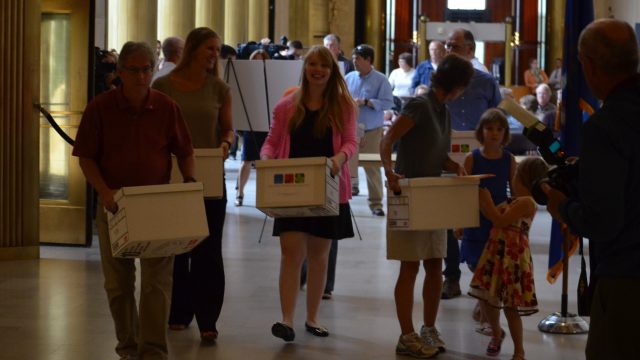Conservationists Spent More Than $8 Per Petition Signature

The conservation activists backing a ballot measure to divert hundreds of millions of dollars in oil tax revenues (billions over the measure’s 25 year lifespan) into a conservation fund with mandated spending turned in their signatures yesterday.
And they turned in a lot. Over 41,000 according to their press release, when just less than 27,000 were required.
They spent a lot of money doing it, too.
After signature fraud kept the measure off the ballot in 2012, the group spent a ton of (mostly out-of-state) money to make the ballot in 2014.
In 2012 the group collected $691,996 in contributions and spent $255,370.25, but failed to get a similar measure on the ballot due to fraudulent petition signatures. In 2013 the group spent another $328,728.05, but reported collecting only $1,569.01 in contributions.
Most of the money fueling the group comes from out of state sources. Of the more than $692,000 in contributions of more than $100 reported to the Secretary of State since 2012, more than 95 percent has come from individuals and groups outside of North Dakota.
Financing for the measure push in 2014 isn’t clear yet. State law doesn’t require committees supporting ballot measures to file any finance disclosures until 32 days before the November election, but one of the most visible members of the coalition has spent big on political activities this year. Ducks Unlimited has made over $538,000 in direct expenditures so far in 2014.
Steve Adair is the Great Plains Region director for Ducks Unlimited and is also serving as the chairman of the committee sponsoring the measure.
But let’s just focus on direct expenditures by the North Dakotans for Clean Water, Wildlife and Parks, and only what they spent in 2013 (we won’t count what they spent on their failed 2012 effort, and we don’t know what they’ve raised/spent so far in 2014).
Even if we assume that the group has spent nothing in 2014, they’ve still spent over $328,000 per signature for roughly 41,000 signatures.
That works out to an astounding $8 per signature. And probably a good deal more, because there’s no question the group has been spending big in 2014.
Which doesn’t exactly speak to the popularity of this measure, does it?
This looks like less of a grassroots effort than a lot of deep-pocketed interests from outside of North Dakota buying signatures so they can legislate at the ballot box.




